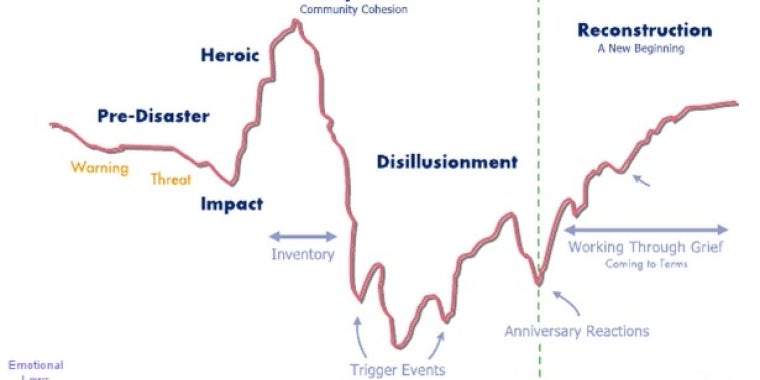
Recovering From a Disaster - Health Tips & Emotional Phases of Disaster Response
Andrew J Lanza
November 29, 2012

Recovering from disaster is usually a gradual process. Safety is a primary issue, as are mental and physical well-being. If assistance is available, knowing how to access it makes the process faster and less stressful.
Your first concern after a disaster is your family’s health and safety. You need to consider possible safety issues and monitor family health and well-being.
Health
- Be aware of exhaustion. Don’t try to do too much at once. Set priorities and pace yourself. Get enough rest.
- Drink plenty of clean water. Eat well.
- Wear sturdy work boots and gloves.
- Wash your hands thoroughly with soap and clean water often when working in debris
Safety Issues
- Be aware of new safety issues created by the disaster. Watch for washed out roads, contaminated buildings, contaminated water, gas leaks, broken glass, damaged electrical wiring and slippery floors.
- Inform local authorities about health and safety issues, including chemical spills, downed power lines, washed out roads, smoldering insulation and dead animals
If you have been physically, emotionally and/or medically affected by Hurricane Sandy see attached flyer for help.
Other news:
FEMA APPROVES $8.2 MILLION FOR POST-SANDY MENTAL-HEALTH OUTREACH
In addition to health precautions post disaster, you should be aware of psychological precautions. This article from the Atlantic describes the Immediate Services Crisis Counseling Assistance and Training Program, an $8.2 million FEMA grant to deliver immediate mental health outreach, crisis, and educational services to an estimated 200,000 individuals apt to be traumatized by the disaster in NYC and seven neighboring counties in Long Island, Westchester and along the Hudson River Valley. To read the article in full, click here.
Share this Article or Press Release
Newsroom
Go to Newsroom
Senator Andrew Lanza Speaks on Senate Bill S51001
July 1, 2022


